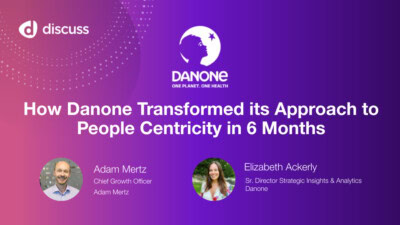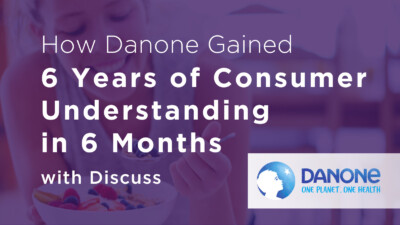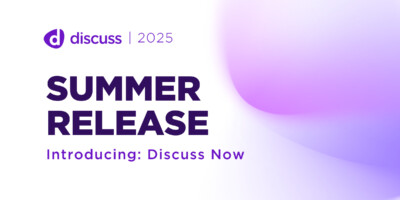Qualitative/Quantitative Hybrid Research: A Middle Ground that Helps Maximize Results
Research is evolving at a faster and faster pace each year, and the team at Discuss.io is proud to contribute to its overall reach, speed, and validity. Part of such is keeping up with the latest trends and mentalities, appraising their effectiveness, and adjusting accordingly.
The basic facets and divisions of research mentalities and processes remain standard. Primarily, they consist of two different methods that both old and new school researchers use to find insight and gauge popularity or effectiveness.
- Qualitative Research examines small panels or interviewees to gather their opinions, reactions, and sentiments about stimulus
- Quantitative Research uses mathematical principles and scientific methods to assess large-scale data
Seemingly more simple, qualitative research can demand far more time, money, and effort than many organizations find feasible. Facilities in high-rent locales, perquisite staff and accommodations, traveling, and a small, geographically dependent pool of volunteers consistently make typical quantitative research a challenge for smaller enterprises and a burden for larger ones. Discuss.io’s HD platform, international pool of 20 million + volunteers, and 1 million + panelists from WebMD dramatically decrease costs while expanding total potential and speed.
However, agile research requires more than just a flexible platform. We like staying on top of the latest methodologies, both to improve our services and ensure our clients receive the most out of them.
One such methodology is quantitative and qualitative hybrids. Typically billed as quant/qual, qualitative/quantitative, or some other name with a forward slash, this methodology combines the internet’s vast info-gathering potential with larger subject pools.
Quant/Qual: Its Importance and Potential
Quant/Qual research closes any potential vacuum between the two methodologies, making the process even quicker and more effective. While integral for creating products that appeal to both repeat and new consumers, qualitative research can also exist in a vacuum if completely divided from a larger quantitative pool.
Qualitative research, traditionally, relies on a costly screening process that assesses the subject in a multitude of ways. Background, preferences, lifestyle, income, and whole slew of other elements are often considered and appraised by researchers before actual stimuli are even introduced. Additionally, these screenings are also subject to human error like miscommunication.
Through online panel companies and other measures, Discuss.io quantitatively shifts through potential panel members and finds the best candidates. Our fearless founders Jim Longo and Zach Simmons cover such details in this press release to Greenbook. While important, there are some specifics that help define what this hybrid method offers.
Specifics of Quant/Qual Research
While a simple hybridization of quantitative and qualitative research, the mentality also includes a few specific purposes and intents.
- Quant/qual research will use larger pools than those typically seen in qualitative projects.
- Quant/qual research will always have more subjectivity than usual for quantitative research.
Perhaps the greatest strength of quant/qual research is the ability to collect and correlate more specific responses more quickly. While not a wholesale replacement of quantitative efforts, adding the mentality to qualitative processes allows researchers to collect more opinions more quickly. The merit and legitimacy of these perspectives, meanwhile, is typically assured through the researchers’ own efforts or the services they go through.
The hybrid process is also good for saving money, at least if analyzing smaller sample pools. Using a traditional pattern of qualitative and the quantitative research typically divides the collection and assessment of opinions. If the qualitative element is lacking, then the quantitative effort will always be misdirected. Information itself is important, yes, but so is actual consensus about the given product.
Quant/qual research offers an intrinsic element that brings robust opinions to the field. While not a total shortcut for hardcore quantitative or qualitative research, the hybrid does dramatically increase one element that is quite significant for all projects: broader, more accurate detail.
Such an approach helps direct researchers to more effective qualitative and quantitative methods, integral for effective initiatives. Information gathered in previous qualitative interviews or panels, if applicable, can also be applied to these different efforts.
Discuss.io makes hybrids far more feasible and cost-effective, helping clients find direction and save their funds to pursue whatever conclusions they gather. While best for preliminary fact finding, it also means specific projects can finish faster and more effective than ever before. Now that’s something to talk about!
Ready to unlock human-centric market insights?
Related Articles

How to Facilitate Meaningful Insights: Strategies for Effective Focus Group Discussions
Conducting a worthwhile focus group requires a strong purpose and well-defined objectives. This isn’t an ordinary chat; it’s an organized…
Conducting a worthwhile focus group requires a strong purpose and well-defined objectives. This isn’t an ordinary chat; it’s an organized…

How to Optimize Engagement with a Virtual Focus Group: Strategies and Tips
Creating successful engagement in virtual focus groups starts with proper planning. This involves everything from the setup of your digital…
Creating successful engagement in virtual focus groups starts with proper planning. This involves everything from the setup of your digital…

Maximize the number of research projects completed by year’s end: Yes, it can be done
Ask most agencies managing enterprise-level market research (MRX) projects, and they’ll tell you they have a love/hate relationship with their…
Ask most agencies managing enterprise-level market research (MRX) projects, and they’ll tell you they have a love/hate relationship with their…



